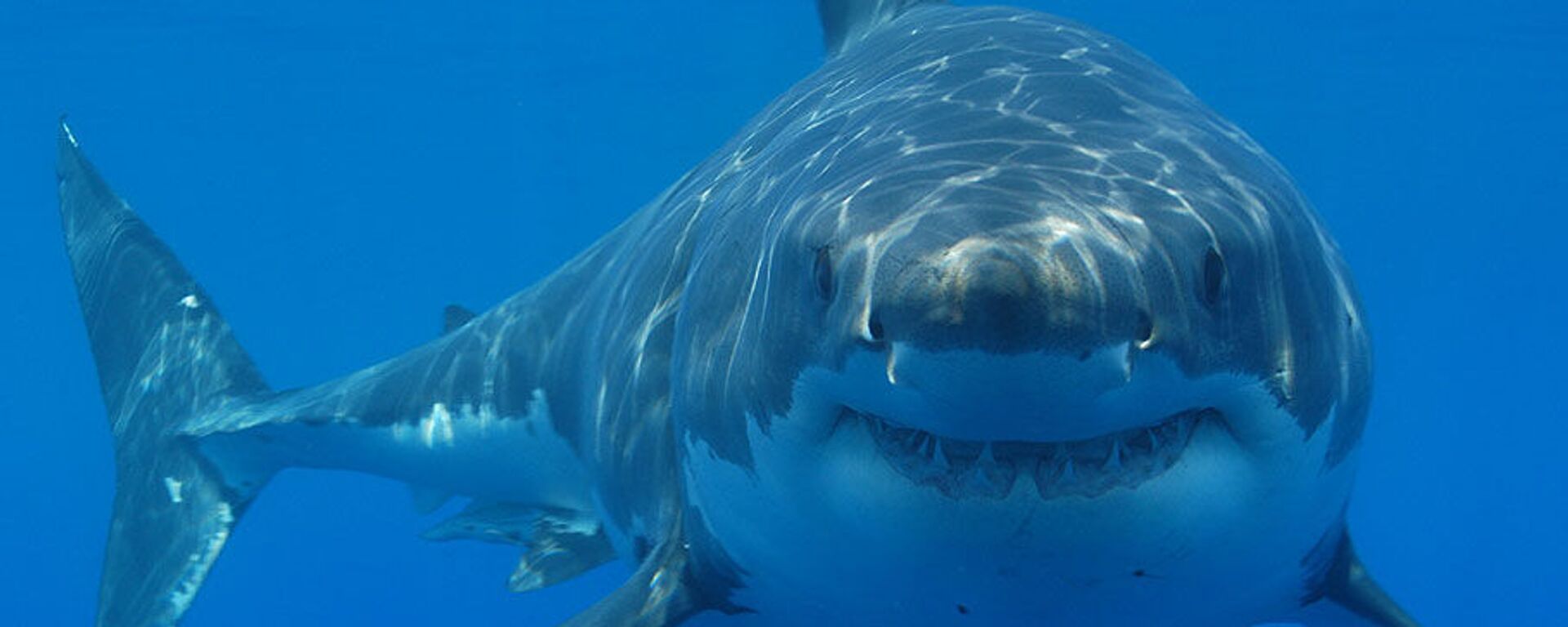https://sputnikglobe.com/20230616/potential-shark-extinction-risk-greater-than-ever-expected-study-finds-1111199991.html
Shark Extinction Risk Greater Than Ever Expected, Study Finds
Shark Extinction Risk Greater Than Ever Expected, Study Finds
Sputnik International
A survey conducted on nearly 400 coral reefs worldwide has shown significant declines in five key shark species, revealing sharks are facing a much higher risk of extinction than expected.
2023-06-16T01:55+0000
2023-06-16T01:55+0000
2023-06-16T01:54+0000
beyond politics
science & tech
sea
shark
biodiversity
extinct species
https://cdn1.img.sputnikglobe.com/img/07e7/05/0b/1110274204_0:235:2622:1709_1920x0_80_0_0_d5d71a55e310cc838e473e7094fe084c.jpg
A comprehensive survey conducted on nearly 400 coral reefs worldwide has shown significant declines in five key shark species, revealing that sharks are facing a much higher risk of extinction than previously believed.Over the past 50 years, populations of reef sharks species have plummeted by 60% to 73%, researchers have determined.The findings are worrisome not only for the loss of the apex predators but also for the potential impact on the marine food chain and coastal communities that rely on healthy marine ecosystems for sustenance.The primary cause of the declining shark populations is rampant overfishing. The survey was conducted by deploying GoPro cameras and bait on reefs across the globe, capturing over 20,000 hours of footage. A team of researchers and volunteers meticulously analyzed the footage, focusing on five key shark species: Caribbean reef sharks, nurse sharks, grey reef sharks, blacktip reef sharks and whitetip reef sharks.The absence of sharks has led to the proliferation of ray species, which have become the dominant top predators in these areas. However, rays cannot fully replace the role of sharks, and the absence of sharks disrupts ocean food webs and biodiversity in coral reefs.Previous research has already warned that a third of all sharks, rays, and related species are at risk of extinction. To address this issue, collaborative efforts between countries are essential. Countries like Costa Rica are working with Ecuador, Colombia, and Panama to expand and connect marine protected areas in the Pacific, facilitating the migration of sharks, whales and sea turtles between ecologically-rich regions.Protecting sharks faces challenges due to their negative reputation, often fueled by rare incidents of shark bites. This public perception makes it more difficult to implement conservation policies, thus making overcoming this obstacle a crucial step for the successful protection of sharks and their ecosystems.The study also identified a glimmer of hope, as many reefs devoid of sharks are in close proximity to healthier reefs with abundant shark populations. By reducing overfishing and implementing conservation measures, these thriving populations could recolonize areas depleted of sharks, offering a chance for recovery.The findings were published in the journal Science.
https://sputnikglobe.com/20221217/one-in-ten-species-will-be-gone-by-end-of-century-research-warns--1105538308.html
https://sputnikglobe.com/20220324/some-great-white-sharks-befriend-each-other-to-pull-in-larger-meals-study-reveals-1094135408.html
Sputnik International
feedback@sputniknews.com
+74956456601
MIA „Rossiya Segodnya“
2023
News
en_EN
Sputnik International
feedback@sputniknews.com
+74956456601
MIA „Rossiya Segodnya“
Sputnik International
feedback@sputniknews.com
+74956456601
MIA „Rossiya Segodnya“
sea ecology, sharks, extinct endangered species, wil sharks extinct, coral reefs biodiversity
sea ecology, sharks, extinct endangered species, wil sharks extinct, coral reefs biodiversity
Shark Extinction Risk Greater Than Ever Expected, Study Finds
Officials have previously indicated that one of the main causes for declining shark numbers is overfishing, as oftentimes the species is victim to shark finning - the illegal practice of removing the fish's fins and throwing the animal back into the ocean.
A comprehensive survey conducted on nearly 400 coral reefs worldwide has shown significant declines in five key shark species, revealing that sharks are facing a much higher risk of extinction than previously believed.
Over the past 50 years, populations of reef sharks species have plummeted by 60% to 73%, researchers have determined.
The findings are worrisome not only for the loss of the apex predators but also for the potential impact on the marine food chain and coastal communities that rely on healthy marine ecosystems for sustenance.
"The situation is really frightening for us scientists working with sharks," said Mario Espinoza, a marine biologist at the University of Costa Rica and a co-author on the paper.
The primary cause of the declining shark populations is rampant overfishing.
Shark fin soup, a delicacy served at celebrations, has led to the practice of shark finning, where fishers remove the fins and discard the rest of the body. Although the US has banned the sale of shark fins, they still command a high price in international markets.
Additionally, fishing fleets inadvertently contribute to the decline by targeting the prey of sharks in some areas.

17 December 2022, 05:52 GMT
The survey was conducted by deploying GoPro cameras and bait on reefs across the globe, capturing over 20,000 hours of footage. A team of researchers and volunteers meticulously analyzed the footage, focusing on five key shark species: Caribbean reef sharks, nurse sharks, grey reef sharks, blacktip reef sharks and whitetip reef sharks.
The absence of sharks has led to the proliferation of ray species, which have become the dominant top predators in these areas. However, rays cannot fully replace the role of sharks, and the absence of sharks disrupts ocean food webs and biodiversity in coral reefs.
Previous research has already warned that a third of all sharks, rays, and related species are at risk of extinction. To address this issue, collaborative efforts between countries are essential. Countries like Costa Rica are working with Ecuador, Colombia, and Panama to expand and connect marine protected areas in the Pacific, facilitating the migration of sharks, whales and sea turtles between ecologically-rich regions.
Protecting sharks faces challenges due to their negative reputation, often fueled by rare incidents of shark bites. This public perception makes it more difficult to implement conservation policies, thus making overcoming this obstacle a crucial step for the successful protection of sharks and their ecosystems.
"It’s very difficult for conservation initiatives of sharks to be welcomed, to be embraced, to actually be implemented," said Dayne Buddo, director of global ocean policy at the Georgia Aquarium, who did much of the survey work around Jamaica. "They see sharks as vicious creatures."
The study also identified a glimmer of hope, as many reefs devoid of sharks are in close proximity to healthier reefs with abundant shark populations. By reducing overfishing and implementing conservation measures, these thriving populations could recolonize areas depleted of sharks, offering a chance for recovery.
The findings were published in the journal
Science.




